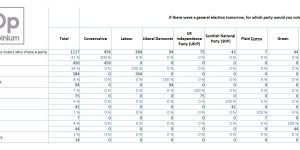Labour Party Manifesto 2010 Supporting families throughout life
The challenge for Britain
To support all families in a rapidly changing world that places new and rising demands on all of us. We will help families to realise their aspirations — whatever their circumstances — and we recognise the huge contribution older people make to society and to family life. The Tories propose a marriage tax allowance that is divisive and unfair, will neglect growing care needs among frail elderly people and disabled adults, and prioritise only the privileged few.
The next stage of national renewal
* More help for parents to balance work and family life, with a ‘Father’s Month’ of flexible paid leave.
* A new Toddler Tax Credit of £4 a week from 2012 to give more support to all parents of young children – whether they want to stay at home or work.
* The right to request flexible working for older workers, with an end to default retirement at 65, enabling more people to decide for themselves how long they choose to keep working.
* A new National Care Service to ensure free care in the home for those with the greatest care needs and a cap on the costs of residential care so that everyone’s homes and savings are protected from care charges after two years in a care home.
* A re-established link between the Basic State Pension and earnings from 2012; and help for ten million people to build up savings through new Personal Pension Accounts.
Strong families are the bedrock of our society. Secure and stable relationships between parents, their children, grandparents and other family members are the foundation on which strong communities are built. Today, parents have rising aspirations for their children and greater choice about how they lead their family and working lives.
Our society is ageing as many more of us live long and fulfilling lives, active in our communities as we enjoy retirement. Retired people bring great strengths to our society – as carers for family members, active grandparents, and pillars of local civic life.
Substantial challenges still remain. Today, tough financial times are placing extra pressures on families – adding to the daily challenges many already face in going out to work to earn a decent income, look after a home, and care for children or older relatives. In many families these pressures fall particularly on mothers. And like every industrialised country across the world, we need to adjust to an ageing society – where demand for health provision will grow, and where the need for care will rise rapidly.
We need services that help families manage these new pressures without creating huge additional costs. We need to go further to secure fairness in later life and ensure that those who plan and save for their retirement are rewarded for doing so. The additional costs and burdens of old age must not fall disproportionately on those who have made provision for themselves and their families.
Strengthening family life
Children thrive best in families in which relationships are stable, loving and strong. We support couples who want to get married and for whom marriage offers the best environment to raise children. Marriage is fundamental to our society,but financial support should be directed at all children, not just those with married parents. We reject proposals that would skew resources to the wealthy, or penalise loving and committed adults who, for whatever reason, are not married, and stigmatise their children.
In today’s fast-changing world, parents want to be confident they have the information and choices they need to protect their children. We will continue to promote internet safety for children, building on the recommendations of Dr Tanya Byron’s review. We will support parents who challenge aggressive or sexualised commercial marketing. We will ask Consumer Focus to develop a website for parents to register their concerns about sexualised products aimed at their children.
We have established the Family Justice Review to examine reforms to the family justice system making it more child-focused and family-centred. Parents who are clear their relationship has broken down and cannot be restored need more help to reach agreement about future arrangements early on in the process, for the benefit of their children.
No child left behind in poverty
No child should have to grow up in poverty. The current pressures on the personal finances of families make the goal of ending child poverty more urgent than ever. So we will continue to make progress towards our historic goal of ending child poverty by 2020, building on the 2010 Child Poverty Act.
In the next Parliament, we will focus on helping families into jobs and out of poverty. Where parents, especially mothers, want to stay at home or work part-time we will do more to help families with younger children, reducing poverty in those vital early years of a child’s life. We will ensure that work always pays for hard-working lone parents. The child element of the Child Tax Credit will be increased by £4 a week for families with children aged one and two from 2012, paid regardless of the marital status of the parents – a Toddler Tax Credit.
A better work-life balance
More than ever, families want support in balancing the pressures of work and home. To help parents strike this balance we will extend real choice to parents over how they organise their parental leave.
We have already increased paid maternity leave to nine months. We continue to believe that one year’s paid leave in the baby’s first year would be of great benefit to parents and their children. However, in the current economic circumstances, progress will inevitably be tougher. So we will introduce more flexibility to the nine months’ paid leave that mothers currently enjoy – allowing them to share this entitlement with fathers after a minimum of six months.
We will introduce a new Fathers’ Month, four weeks of paid leave rather than the current two. We will also work with employers on how this can be taken flexibly – for instance, two weeks around the birth, and the remaining two weeks taken flexibly over the first year of the baby’s life, including the option of sharing these extra weeks between parents. This will be paid for as savings accrue from housing benefit through our reforms.
Our new agenda for families must reflect the change in working patterns that has emerged over the last 20 years. A high proportion of parents no longer work the traditional day, while increasing numbers of families depend on part-time work to manage their caring and job responsibilities. Many still struggle to find quality part-time jobs that use their skills, so we will promote the creation of more highly skilled, quality jobs for parents who choose to work more flexibly.
We created the right to request flexible working for parents and carers so that millions of individuals and their families could exercise more choice about how to balance their work and caring responsibilities. But as the burden of caring increases in our society we need to go further. By the end of the next Parliament we will ensure that the right to flexible working is extended for older people, recognising that many, including grandparents, want to vary their hours to the benefit of their families and to accommodate changing lifestyles. We will consult on the age at which this right should apply.
Helping older people who want to work
Age discrimination in the workplace has been banned.
As well as promoting flexible working, we will now proceed to end default retirement at 65, with a review to establish the right way in which to support more people to work longer should they choose to do so. To expand the choices available for those wishing to work after retirement, we will enable people aged 60 and over to claim Working Tax Credit if they work at least 16 hours a week, rather than 30 hours as at present.
A good quality of life in older age
The vast majority of older people are well and active, helping to strengthen our families, communities and wider society. Many charities, voluntary organisations and schools value and rely on the contribution of older people and we support the growing number of excellent initiatives creating greater understanding across the generations. We will continue to support older people in getting involved in their community by providing matched funding for community projects.
Parents who are able to call on grandparents to help with childcare, or during emergencies, know how essential their support is to a strong family life. Grandparents who give up work to help care for their grandchildren must not lose out, so they will receive National Insurance Credits towards their state pension. We will remove the requirement on grandparents to apply for the court’s permission before making an application for contact with their grandchildren and we will ensure that grandparents and other family members are always given first consideration for adoption or fostering.
Better pensions for all, tackling pensioner poverty
Our commitment to fairness has put pensioner poverty at the top of our agenda for Britain. Older-age poverty has been dramatically reduced compared to a generation ago. We recognise that it is right that pensions should rise in line with the nation’s wealth. So to increase security in retirement, we will restore the link between the basic state pension and earnings from 2012 – a link broken by the Tories in 1980. Pension credit, which ensures that no pensioner need live on less than £132.60 per week or £202.40 for couples, and supports the income of 2.7 million pensioner households, will also rise in line with earnings. Six in ten pensioners currently pay no income tax.
We will continue to provide help to pensioners, with the Winter Fuel Payments (maintained this winter at £250 for those over state retirement age and £400 for those aged 80 or over); concessionary public-transport fares; free TV licences for the over-75s; and free eye tests and prescriptions.
Saving for pensions
As a country, we need to save more for retirement – individuals, employers, and the Government will all need to play their part. We will support ten million low-and middle-income people to build up savings through automatic enrolment in occupational pensions and new Personal Pension Accounts, ensuring that everyone in work is entitled to matched contributions from employers and government.
We will continue to make pension saving more attractive for individuals through favourable tax treatment. And we will promote stakeholder pensions offering simple, low-cost and flexible products, obliging employers to provide access to a pension for all employees. We will continue to protect pension schemes when a firm’s company scheme goes bust. We are also introducing more flexibility to make it easier for companies to run good schemes.
Between now and 2020 the State Pension Age for woman will rise to 65; and between 2024 and 2046, it will rise to 68 for both men and women, helping to keep state pensions affordable in the long term. The reforms we are making to public-sector pensions will keep them sustainable and affordable over the long term.
The National Care Service and an age-friendly NHS
The cornerstone of a fair future is ensuring everyone who needs care and support, whether through old age or disability, is properly looked after. We will establish a new National Care Service and forge a new settlement for our country as enduring as that which the Labour Government built after 1945. It will be a new settlement for all those who need care, for the carers who devote their time and energy for the good of others, and for families across the country. The care of both older people and disabled adults will be transformed; unfair postcode lotteries removed; more people will be looked after at home; and family homes and savings will be protected from catastrophic care costs. To provide independence and control for everyone with a care need we will continue to expand the use of individual budgets. And to drive up standards, we will develop a skilled and highly motivated workforce.
The first stage of reform will be to create a step-change in the provision of services in the home and in our communities. From 2011 we will protect more than 400,000 of those with the greatest needs from all charges for care in the home, and we will create a national physio support service helping people in every area of the country to regain their independence and confidence after a crisis or the first time they need care. These services are essential if we are to ensure more people are looked after in their homes and overall costs are to be controlled. They will be funded through savings and efficiencies in the health budget and in local government.
During the next Parliament, the second stage of reform will centre on the development of national standards and entitlements to ensure high- quality care for all, and an end to the unfair postcode lotteries that affect too many families. We also want to remove the fear that families will lose the family home in order to pay for care bills. So, from 2014, the National Care Service will cap the costs of residential care so that everyone’s homes and savings are protected from care charges after two years. We will pay for this through our decision to freeze Inheritance Tax Thresholds until 2014-15, by supporting more people over the State Pension Age to stay in work if they so wish, and through efficiencies across the NHS and the care system.
The final stage of reform, after 2015, will be a comprehensive National Care Service, free at the point of use not just for older people, but all adults with an eligible care need whoever they are, wherever they live and whatever condition leads to them needing care. At the start of the next Parliament we will establish a Commission to reach a consensus on the right way of financing this system. The Commission will determine the options which should be open to individuals so that people can have choice and flexibility about how they pay and to ensure that the National Care Service is funded in a fair way. The Commission will make recommendations in time for implementation of the third stage of reform after 2015, once these proposals have been put to the public at a general election.
Across the NHS we will improve and personalise care for the elderly and their families. This will mean more NHS services available in the home, with greater use of tele-care and personal nursing; reform of the GP contract to help ensure those with late-life depression and anxiety are diagnosed and supported; and better services for those with dementia and Alzheimer’s so that every area of the country has access to psychological therapy, counselling and memory clinics. There will be an end to the age-discrimination that has too often seen older people disadvantaged in the provision of health services.
Labour Manifesto 2010
Labour Manifesto 2010 : Introduction
Labour Manifesto 2010 : Building the high-growth economy of the future
Labour Manifesto 2010 : Prosperity for all not just a few
Labour Manifesto 2010 : Excellence in education: every child the chance to fulfil their potential
Labour Manifesto 2010 : World-leading healthcare: a patient-centred NHS The challenge for Britain
Labour Manifesto 2010 : Strengthening our communities, securing our borders
Labour Manifesto 2010 : Supporting families throughout life
Labour Manifesto 2010 : A green future for Britain
Labour Manifesto 2010 : A new politics: renewing our democracy and rebuilding trust
Labour Manifesto 2010 : Meeting the challenges of the new global age













View Comment
Thanks Arabella, I’d made an error when I uploaded the text, issues with the formatting of converting PDF documents to text documents, if they aren’t formatted correctly the columns merge together resulting in the sort of mess above.
Had the problem with all the manifestos I’ve converted from PDF to a web page so far (Labour, Conservative, Lib Dems and UKIPs) had to manually sort through them line by line and I’m sure this won’t be the only mistake I missed!
Fixed the error now.
Thanks again.
David
View Comment